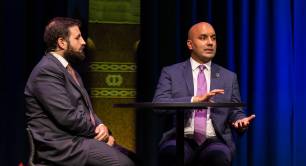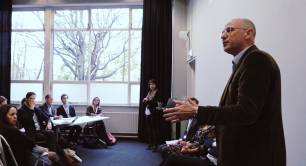Short n Sweet: 23 January 2020 - From why to how on impact measurement
Bite-sized stories this week from the impact economy around the world: a “historic shift” among impact investors on impact measurement, insights on family giving, and a Starbucks-backed cup recycling drive. Plus, new faces and departures, and the latest opportunities for social entrepreneurs.
From ‘why’ to ‘how’: impact investors progress to impact measurement 2.0
Impact performance is becoming “a powerful differentiator” among all forms of investing, according to the Global Impact Investing Network (GIIN) co-founder and CEO, Amit Bouri.
In the foreword of GIIN’s new report, The State of Impact Measurement and Management Practice, Bouri describes “a historic shift” among impact investors: from a phase of building buy-in around the importance of impact measurement and management, to a focus on integrating it into all investment processes.
The research polled 278 impact investors, and is the most comprehensive view of impact measurement and management (IMM) to date.
It found that IMM responsibilities are increasingly part of the job description: on average, one-third of respondents’ full-time employees contribute to IMM in some way. 81% of respondents also said they give ‘significant consideration’ to impact data at the due diligence phase.’
Investors cited the lack of transparency on impact performance as a key challenge facing the market, while the most common challenges at the organisational level was the inability to compare impact results with market performance and issues in collecting quality data. On average, impact investors spend an estimated 12% of their organisation’s total budget on IMM-related activities, with the biggest chunk of this spent on data collection and reporting.
- Read our interview with Amit Bouri: “Every single person who was there has a role” – GIIN co-founder Amit Bouri
Environment lags behind in family giving – but younger generations heavily involved
Wealthy families giving their money away are most likely to choose education causes, while environmental ones remain relatively unpopular.
Education is the top cause families give to globally, constituting 29% of the average philanthropic portfolio, according to research among 201 families in 28 countries whose combined giving over the last 12 months totalled $2.4bn. This is followed by health (14%), and the arts, culture and sports (10%), while environmental causes received just 8% of the giving portfolios in this survey.
The study – Global Trends and Strategic Time Horizons in Family Philanthropy 2020, by Rockefeller Philanthropy Advisors and Campden Wealth – also found a “surge” in popularity of time-limited philanthropy, often due to a founder’s desire to see an impact during his/her lifetime.
The “next generation” has a significant influence in family philanthropic initiatives across all regions surveyed: 81% of families report that the next generation of wealth holders is engaged in their family’s philanthropy in some way.
Starbucks-Hubbub collaboration to fund coffee cup recycling drive
Hubbub, the UK-based environmental campaigns charity – and our 2019 SE100 Storytelling champion – is investing £300,000 to set up coffee cup recycling facilities in five locations across London.
The funding has been provided through the Cup Fund grant programme, which is financed by the voluntary 5p charge that Starbucks has added to its single-use coffee cups.
The new facilities aim to recycle 4m cups a year, turning them into new products including paper bags and greetings cards.
The plastic lining in coffee cups means they can’t be recycled along with other paper and card – something that three quarters of Brits are unaware of, according to Hubbub research. Of the 3bn coffee cups used annually in the country, only 4% of them are currently recycled.
New faces and departures: Belu, Packard Foundation, Samaritans, SOCAP, Equality Fund
Bottled/filter water enterprise Belu has announced its new CEO as Natalie Campbell, co-founder of social innovation agency A Very Good Company and former chair of the Nominet Trust (now Social Tech Trust). She was also on the board of UnLtd for 10 years, and is currently a Civil Service Commissioner and board member of the National Lottery Community Fund and of LEAP, the Mayor of London's economic action partnership. Campbell takes up the role on 1 March, replacing Karen Lynch who had been with the company for 10 years. Check back soon for our interview with outgoing CEO Karen Lynch.
Nancy Lindborg, president and CEO at the US Institute of Peace (USIP), is to join the 55-year-old David and Lucile Packard Foundation, as its new president and CEO.
UK charity Samaritans has appointed Jeremy Hughes as its new CEO, who has spent 10 years as CEO of the Alzheimer’s Society. Hughes replaces Ruth Sutherland, who was awarded a CBE in this year’s New Year Honours.
In Canada, feminist grantmaker the Equality Fund has appointed Bonnie Foley-Wong as head of investment strategy. Wong previously led impact investment firm Pique Ventures, which she founded.
And Lindsay Smalling is to step down from her role as CEO of SOCAP – which puts one of the world’s biggest yearly impact investing events in San Francisco – according to ImpactAlpha.
| To share appointments or opportunities in our Short n Sweet column, published most Thursdays, send details to news@pioneerspost.com. We will do our best to include all relevant news. |
Opportunities for social entrepreneurs: Europe, UK, US, Ireland
The deadline is fast approaching for the 2020 NatWest SE100 and Social Business Awards. UK-based social enterprises and investors should apply by Friday 31 January for the chance to be listed among the country’s most groundbreaking organisations in the field.
More opportunities for social entrepreneurs this week:
- Europe: Entries to the 2020 European Social Innovation Competition have opened, this time on the theme Reimagine Fashion: Changing behaviours for sustainable fashion. The competition is open to early-stage projects and ideas that will change the ways we produce, buy, use and recycle fashion, with €50,000 up for grabs. Open to anyone based in EU Member States or 16 ‘associated’ countries; apply by 4 March.
- Europe: Switzerland-based SEIF has opened applications for its 2020 Tech for Impact awards. Open to entrepreneurs across Europe who develop or make innovative use of technologies to tackle social and/or environmental challenges. Apply by 31 March.
- UK: The Aviva Community Fund is offering UK-based causes (annual turnover under £1m) up to £50,000 funding for innovative community projects, plus crowdfunding support from Crowdfunder. Apply by 11 February.
- UK: ImpactHub King’s Cross is looking for sustainable food businesses to join its six-month Feeding The City: Accelerate programme. Apply by 9 February.
- UK: Nesta is offering 10 ‘Democracy Pioneers’ £10,000 each to support new forms of everyday democracy and civic participation. For-profit organisations may be considered. Apply by 31 January.
- Ireland: The Social Enterprise Development Fund – which has just received another €1.6m – will offer 16 social enterprises in Ireland a grant of €10,000-€50,000 plus a place on Social Innovation Fund Ireland’s six-month accelerator programme. Apply by 6 March.
- USA: New York-based social entrepreneurs can now ‘borrow’ an expert from the Human Lending Library, which has just opened its third branch (and its first non-UK one) in the city.
Thanks for reading our stories. As somebody working in the impact economy, you'll know that producing quality work doesn't come free. We rely on paid subscriptions and partnerships to sustain our purpose-led journalism – so if you think it's worth having an independent, specialist media platform to share your news, insight and debate across the globe, please consider subscribing. You'll also be buying social: Pioneers Post is a social enterprise itself, reinvesting all profits to help you do good business, better.
EDITOR'S NOTE 27/01/2020: The original article omitted Bonnie Foley-Wong's full surname and her previous role as founder of Pique Ventures. These have now been corrected.



